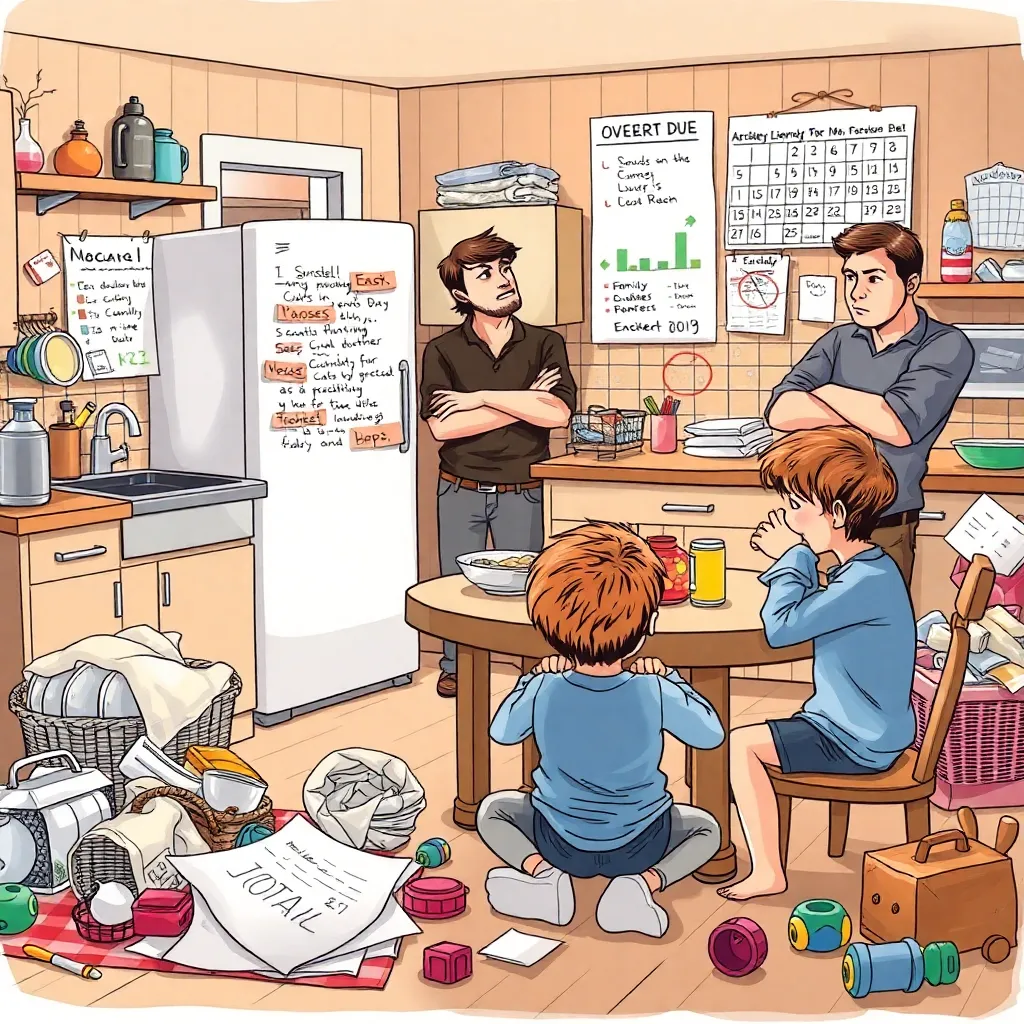Navigating the complexities of family dynamics can often feel like walking a tightrope, where balance is crucial yet elusive. Many families experience moments of tension or misunderstanding, but sometimes, hidden signs can quietly escalate these moments into full-blown chaos. As life’s demands increase, subtle issues can be overlooked, leading to bigger conflicts that ripple through the family unit. Recognizing these hidden signs not only fosters harmony but also strengthens the bonds that hold families together.
Understanding the subtle signals that disrupt family life is essential for cultivating a nurturing home environment. While these signs may not be immediately apparent, their impact can be profound, causing long-term emotional strain. By identifying and addressing these hidden disruptions, families can take proactive steps to prevent chaos from taking root. This article will guide you through ten often-overlooked signals that could be undermining your family’s well-being.
With empathetic insights and practical advice, we aim to equip you with the knowledge to transform potential discord into opportunities for growth and understanding. You will learn how to spot these signs early and implement strategies to address them effectively. Our hope is that, with this guidance, your family can enjoy deeper connections and a more harmonious home life. Let’s delve into these hidden signs and explore how you can create a more peaceful and supportive family environment.
1. Silent Treatment Becomes Routine

In many families, the silent treatment becomes a routine way of handling conflict, often without realizing its impact. When disagreements arise, one partner might resort to silence, thinking it’s a temporary solution, but it can lead to long-term emotional damage.
Imagine a couple where one partner shuts down every time an argument begins. This habit, while seemingly harmless, can create a cycle of misunderstandings and unresolved feelings, leading to a growing emotional distance.
Family therapist Dr. Emily Collins notes that the silent treatment can be a form of emotional manipulation, though often unintentional. It forces the other person to guess what went wrong, creating an environment of uncertainty and tension.
Recognizing this pattern can be the first step toward healthier communication. Encourage open dialogues and create a safe space for expressing emotions without fear of being met with silence.
In conclusion, breaking the cycle of silent treatment can foster a more supportive family dynamic. By addressing issues directly, families can build stronger, more resilient relationships.
2. Unspoken Resentments Accumulate Daily

While silent treatment can erode communication, the accumulation of unspoken resentments often brews silently beneath the surface. Over time, these feelings can transform small disagreements into a full-blown emotional chasm that seems impossible to bridge.
Imagine a partner repeatedly forgetting to call when running late—this might seem insignificant but can foster a growing sense of neglect. When these minor grievances go unaddressed, they can snowball into feelings of bitterness that impact the entire family dynamic.
Experts suggest that harboring unspoken resentments can lead to a cycle of passive-aggressive behavior that disrupts household harmony. By encouraging open and honest communication, families can address these underlying issues before they escalate.
Consider setting aside a weekly time for family members to share their feelings without fear of judgment or retaliation. This practice not only helps in diffusing tension but also strengthens the emotional bonds within the family.
Resentments left unspoken can act like a silent poison, gradually eroding trust and love. By tackling these issues head-on with empathy and understanding, families can foster an environment of mutual respect and support.
3. Personal Space Is Disregarded

When family members consistently ignore each other’s need for personal space, it can lead to a heightened sense of tension and discomfort. For example, a teenager might find their privacy invaded if a parent regularly enters their room without knocking, leading to feelings of frustration and lack of autonomy.
Respecting personal space is crucial for maintaining healthy boundaries within a family. Consider the scenario where a partner feels overwhelmed because their significant other does not give them time alone to decompress after work, potentially resulting in unnecessary arguments.
To address these boundary issues, families can benefit from having open conversations about each member’s need for individual space. These discussions can foster mutual understanding and respect, allowing everyone to feel more comfortable and secure in their home environment.
Experts suggest that creating designated areas or times for solitude can greatly enhance familial harmony. For instance, establishing a rule that everyone can have an hour of uninterrupted time each evening can be a simple yet effective solution.
By recognizing and respecting each other’s space, families can reduce unnecessary conflicts and create a more peaceful and supportive home environment. Ultimately, this practice can lead to stronger, more resilient relationships that thrive on mutual respect and understanding.
4. Passive-Aggressive Comments Increase

Passive-aggressive comments can slowly erode the foundation of family relationships. These seemingly innocuous remarks, often masked as jokes or sarcasm, can leave lasting emotional damage. Imagine a family dinner where a parent consistently makes comments about a child’s time management in front of everyone. While it may seem harmless, over time, these remarks can build resentment and misunderstandings.
Such behavior often stems from an inability to express feelings directly. When family members feel unheard or unable to communicate openly, they might resort to indirect expressions of discontent. This can create a cycle of tension where the underlying issues remain unresolved, leading to more passive-aggressive exchanges. Addressing this involves fostering an environment where everyone feels comfortable speaking their mind without fear of judgment.
Experts suggest that creating a space for honest conversation is key. Encouraging open dialogue can dismantle the barriers that lead to passive-aggressiveness. Family meetings or regular check-ins can serve as platforms for all members to voice their concerns and feelings. This proactive approach helps in understanding each other’s perspectives, reducing the need for indirect communication.
Ultimately, the goal is to replace passive-aggressive comments with compassionate and direct communication. By doing so, families can cultivate a more supportive and harmonious environment. Embracing this approach can significantly reduce chaos, strengthening the bonds that hold the family together.
5. Financial Secrets Are Kept

Financial secrets can quietly erode the foundation of a family, leading to mistrust and discord. When a partner hides expenses or debt, it can create a rift that is difficult to mend, much like discovering a crack in what was thought to be a solid wall.
Consider a scenario where one partner secretly accumulates credit card debt, hoping to manage it without the other knowing. This kind of behavior often backfires when the truth comes out, leaving the other partner feeling betrayed and blindsided.
Open communication about finances is crucial for maintaining trust and harmony in any relationship. Experts suggest creating a shared budget and having regular financial discussions to prevent misunderstandings and ensure transparency.
Avoiding financial secrets can also help children learn positive money management skills through observing healthy family discussions. By modeling openness and cooperation, parents prepare their children for future financial independence.
Ultimately, the key is to approach financial matters as a partnership, fostering an environment where both partners feel comfortable discussing their concerns and goals. This proactive approach can transform potential chaos into a cohesive, supportive family dynamic.
6. Emotional Needs Are Ignored

When emotional needs are ignored, it creates a silent storm that can disrupt family harmony. Imagine a mother constantly taking care of everyone yet never feeling appreciated, which leaves her feeling emotionally drained and invisible.
In families, members might be speaking, but not really listening to each other’s needs. This lack of genuine emotional engagement can lead to feelings of neglect and resentment over time, as individuals feel their emotions are not being validated.
Consider the example of siblings who bicker constantly because they feel they must compete for attention. If their parents overlook the underlying need for individual recognition, it can foster a long-standing emotional disconnect.
Experts suggest that actively acknowledging and addressing each other’s emotional needs can prevent larger conflicts. By creating an environment where everyone feels heard and supported, families can nurture stronger, healthier connections.
The key takeaway is that when families prioritize emotional well-being, they build a foundation of trust and empathy that sustains them through life’s challenges. Recognizing and addressing these hidden emotional signals can transform the family dynamic, turning chaos into harmony.
7. Sibling Rivalry Escalates Constantly

When sibling rivalry becomes a continuous battle, it creates a ripple effect that affects the entire family. Instead of fostering a bond, the constant competition can lead to emotional exhaustion for parents, creating a tense home environment.
Consider a family where siblings are always compared, leading to a constant need to one-up each other. This ongoing cycle can make children feel like they are never enough, creating long-term self-esteem issues.
Experts often suggest that parents should focus on celebrating each child’s unique strengths rather than comparing them. By doing so, siblings are more likely to feel valued for who they are, reducing the need for rivalry.
In practice, families can designate specific times for siblings to collaborate rather than compete, such as through joint projects or shared responsibilities. These activities can help siblings see each other as allies, not adversaries.
Ultimately, reducing sibling rivalry requires consistent effort and understanding from the entire family. By fostering an environment of cooperation and appreciation, families can transform chaos into harmony and build stronger bonds.
8. Parental Favoritism Evident

Parental favoritism can be like an invisible thread that pulls at the very fabric of family dynamics. When children notice that one sibling consistently receives more attention, it can breed feelings of resentment and inadequacy. Often, these feelings are not voiced, leading to a buildup of emotional tension that can manifest in unexpected ways. In some families, it might look like one child being praised for their achievements while another’s efforts go unnoticed, creating a sense of unfairness.
Parents might not even be aware they’re exhibiting favoritism, as it can stem from unconscious biases or relatable similarities. However, children are incredibly perceptive and can pick up on these nuances, which can lead to long-standing emotional wounds. Real-world examples often include the favored child receiving more privileges or leniency in rules, which can create deep-rooted divides among siblings. To combat this, it’s crucial for parents to engage in self-reflection and strive for balanced attention.
One effective approach is for parents to make a conscious effort to celebrate each child’s unique strengths and achievements equally. Creating family rituals that include everyone and highlight individual contributions can foster a more inclusive environment. For example, weekly family meetings where each child shares their accomplishments can help ensure everyone feels valued. Additionally, parents should encourage open communication, allowing children to express their feelings about family dynamics safely.
Experts suggest that parents should regularly assess their parenting approaches and remain open to feedback from all family members. By doing so, they can address favoritism before it turns into a significant issue, ensuring each child feels loved and appreciated for who they are. Ultimately, awareness and intentionality are key to preventing favoritism from creating chaos in the family. When every member feels seen and heard, it sets a foundation for harmony and mutual respect within the household.
9. Household Chores Cause Conflict

When it comes to maintaining a harmonious household, the division of household chores can often become a source of conflict. Many families find themselves in heated discussions over who is responsible for what tasks, leading to feelings of resentment and frustration.
Consider the scenario where one partner feels overwhelmed by the majority of the chores, while the other is unaware of this imbalance. This can lead to a buildup of tension, impacting not just the couple, but the entire family dynamic.
Experts suggest that an open conversation regarding chore distribution can significantly ease tensions. By sitting down together and clearly defining each person’s responsibilities, families can foster a more equitable environment.
It’s essential for every family member, including children, to have a role in maintaining the home. Assigning age-appropriate chores not only helps balance the workload but also teaches valuable life skills.
Ultimately, addressing chore-related conflicts with empathy and fairness can help create a more peaceful and supportive home atmosphere. So, take the time to communicate, listen, and adjust as needed to maintain family harmony.
10. Family Traditions Are Abandoned

When family traditions are abandoned, a subtle chaos begins to weave its way through the family fabric. These traditions, whether it’s a Sunday brunch or a holiday ritual, serve as a connective tissue that binds members together. Imagine a family that used to gather every Thanksgiving to cook together, but now everyone is too busy or uninterested. Over time, this absence of shared moments can lead to a sense of disconnection and loss of familial warmth.
Experts highlight that maintaining family traditions fosters a sense of belonging and continuity. Dr. Emily Carter, a family therapist, notes, “Traditions help families create lasting memories and provide a sense of stability.” If you’ve noticed these traditions slipping away, it’s time to reignite the flame by initiating those meaningful activities, even if they’re scaled down. Sometimes, it’s about adapting old traditions to fit new circumstances rather than letting them fade away entirely.
Consider the story of a family who, after years of neglecting their weekly movie nights, decided to revive them with a new twist—each member picks a film on rotation. This simple act restored their connection and brought laughter back into their lives. By making small yet thoughtful efforts to uphold traditions, families can strengthen their bonds and create emotional anchors amidst the chaos of modern life.
Reviving traditions isn’t just about preserving the past; it’s about building a meaningful future. These rituals give family members something to look forward to, providing a break from everyday stress and a chance to reconnect. As you nurture these traditions, you create a tapestry rich with shared experiences, reinforcing the pillars of love and understanding in your family. Remember, the heart of any family lies in its ability to cherish and celebrate togetherness.
Conclusion: Creating Beautiful Outdoor Spaces
In navigating the complex dynamics of family relationships, recognizing subtle yet impactful signs is crucial. This article explored ten hidden signs that can disrupt harmony: unspoken expectations, passive-aggressive communication, favoritism, lack of quality time, unresolved past conflicts, inconsistent boundaries, financial secrecy, emotional disconnection, neglect of self-care, and avoidance of difficult conversations. Each of these factors can silently erode the foundation of familial bonds if left unchecked.
To start improving your family relationships today, consider initiating an open conversation about expectations and feelings. This can pave the way for deeper understanding and resolution. Remember, change begins with awareness, and by addressing even one of these signs, you can make a significant positive impact.
To ensure you have these insights at your fingertips, save or bookmark this article. It will serve as a valuable guide as you navigate the complexities of family life. Moving forward, embrace the journey toward relationship success with confidence, knowing that with consistent effort and understanding, harmony and resilience can flourish in your family. Your proactive steps today lay the groundwork for a supportive and loving environment tomorrow.
